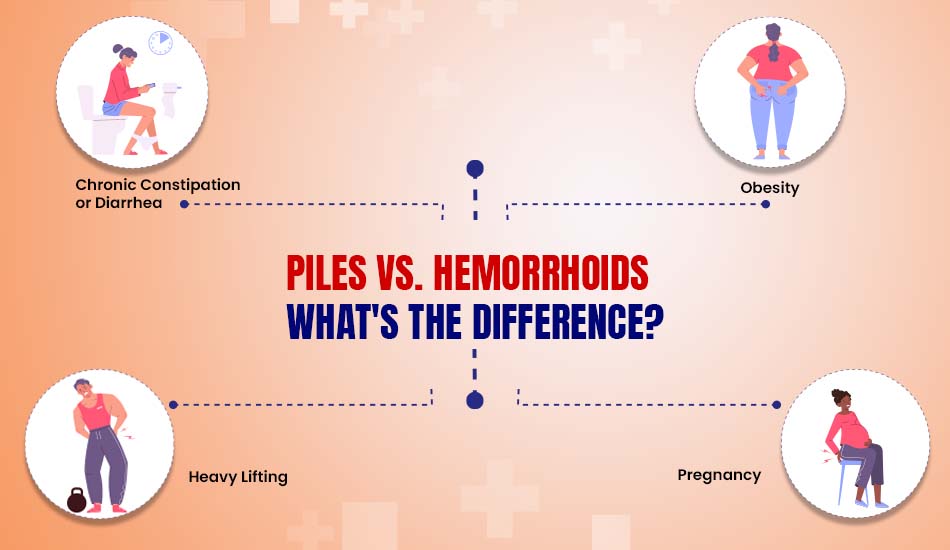
Piles vs. Hemorrhoids: What's the Difference?
Wednesday, 5th June 2024When it comes to rectal and anal health, the terms "piles" and "hemorrhoids" are often used interchangeably. This can lead to some confusion. Are they the same thing, or is there a difference between the two? Let’s clear up the confusion and understand what these terms mean.
Understanding Piles and Hemorrhoids
First things first: piles and hemorrhoids are indeed the same condition. The difference lies in the terminology used in different regions. "Hemorrhoids" is the term commonly used in medical literature and in the United States, while "piles" is more frequently used in the UK and other parts of the world. Both terms refer to swollen veins in the lower rectum and anus.
What Are Hemorrhoids (Piles)?
Hemorrhoids, or piles, are swollen and inflamed veins in the rectum and anus that cause discomfort and bleeding. They are similar to varicose veins you might find in your legs. Hemorrhoids can be internal or external:
- Internal Hemorrhoids: These are located inside the rectum. They usually aren't visible or painful, but they can cause bleeding.
- External Hemorrhoids: These are found under the skin around the anus. They can be itchy, painful, and sometimes bleed.
Causes of Hemorrhoids (Piles)
Several factors can contribute to the development of hemorrhoids or piles:
- Straining During Bowel Movements: This can cause the veins in the anus to swell.
- Chronic Constipation or Diarrhea: Both conditions can lead to increased pressure on the rectal veins.
- Sitting for Long Periods: Especially on the toilet, can cause hemorrhoids.
- Obesity: Excess weight puts pressure on the pelvic veins.
- Pregnancy: The weight of the baby in the abdomen puts pressure on the veins in the pelvic area.
- Heavy Lifting: Repeatedly lifting heavy objects can increase abdominal pressure.
Symptoms of Hemorrhoids (Piles)
Whether you call them hemorrhoids or piles, the symptoms are the same. They can include:
- Bleeding During Bowel Movements: You might notice bright red blood.
- Itching or Irritation: Around the anus.
- Pain or Discomfort: Especially during bowel movements.
- Swelling Around the Anus: A lump near the anus can be a sign of an external hemorrhoid.
- Leakage: Difficulty in controlling bowel movements.
Diagnosis and Treatment
Diagnosing hemorrhoids or piles usually involves a physical examination. Your doctor may use several methods:
- Visual Examination: To check for external hemorrhoids.
- Digital Rectal Examination (DRE): To feel for abnormalities inside the rectum.
- Anoscopy: A scope is used to look inside the rectum.
Treatment options include:
- Home Remedies: High-fiber diet, hydration, warm baths, and over-the-counter creams.
- Medical Treatments: Prescriptions for stronger medications, minimally invasive procedures like rubber band ligation, or sclerotherapy.
- Surgical Options: In severe cases, procedures like hemorrhoidectomy or stapled hemorrhoidopexy may be necessary.
Preventing Hemorrhoids (Piles)
Preventing hemorrhoids or piles involves lifestyle changes that reduce the strain on your rectal veins:
- Eat a High-Fiber Diet: Include plenty of fruits, vegetables, and whole grains.
- Stay Hydrated: Drink plenty of water to keep stools soft.
- Exercise Regularly: Helps prevent constipation and reduces pressure on veins.
- Avoid Straining: Don’t delay bowel movements and don’t strain.
- Use the Toilet When Needed: Don't wait when you feel the urge.
Why Choose Shriram Hospital for Hemorrhoids (Piles) Treatment?
At Shriram Hospital, we provide expert care for hemorrhoids or piles. Our dedicated team of specialists offers comprehensive treatment options to ensure you get the best possible care.
Conclusion
In summary, there is no difference between piles and hemorrhoids—they are simply two names for the same condition. Understanding this can help you seek the right treatment and make informed decisions about your health. If you’re experiencing symptoms, don’t hesitate to reach out to Shriram Hospital for expert care and guidance.


